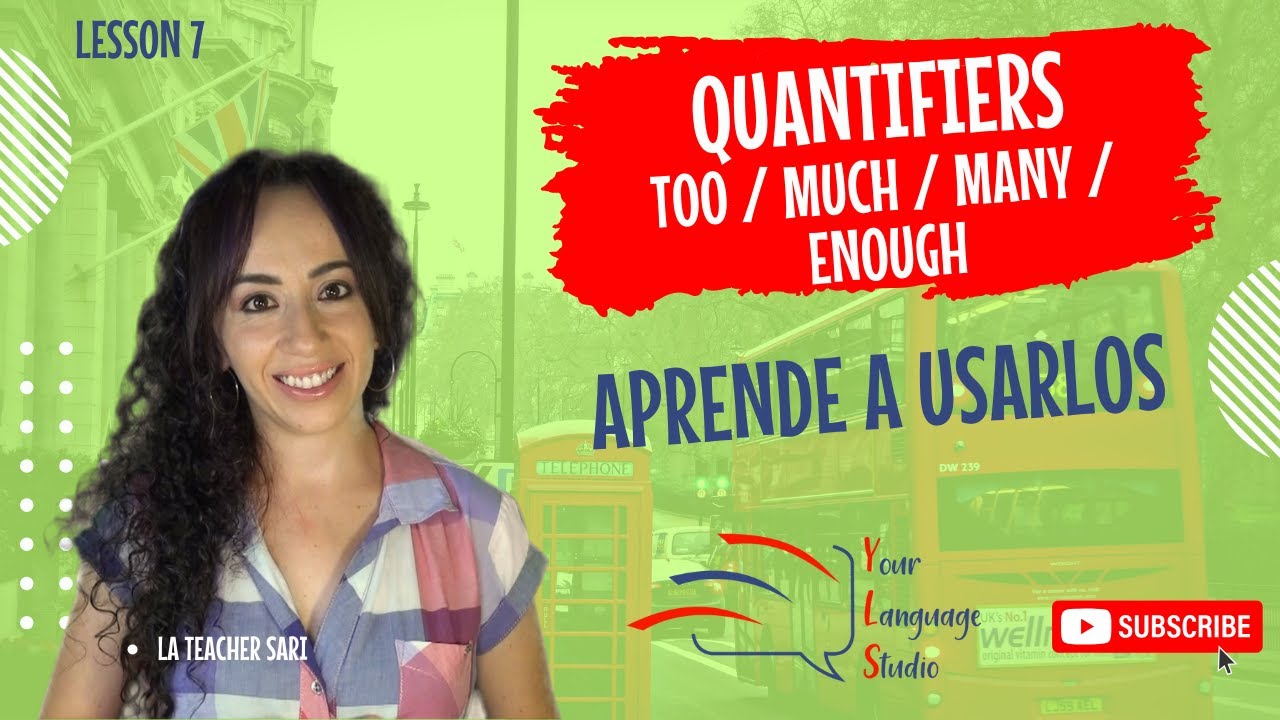MUCH / MANY / A LOT OF: APRENDA A REGRA! (Countable/Uncountable nouns)
Summary
TLDRIn this video, Karina from English in Brazil explains the difference between 'much' and 'many,' focusing on their use with countable and uncountable nouns. She provides several examples to clarify when to use 'much' (for uncountable nouns like water, money, and sugar) and 'many' (for countable nouns like apples, people, and drinks). Karina also touches on common mistakes and alternative expressions like 'a lot of' and 'lots of.' The video is a helpful guide for English learners looking to improve their grammar and vocabulary.
Takeaways
- 😀 Much is used with uncountable nouns, while many is used with countable nouns.
- 📝 Examples of countable nouns include 'apples' and 'people,' while examples of uncountable nouns include 'water' and 'sugar.'
- 🥤 Use 'How much' for uncountable nouns, like 'How much water do you drink?'
- 🍎 Use 'How many' for countable nouns, like 'How many apples are there?'
- 💰 Money can be tricky as it is uncountable, but dollars and cents are countable.
- 🌊 For liquids like water, coke, or juice, the term is uncountable, but bottles or cans of these liquids are countable.
- 👥 Phrases like 'a lot of' or 'lots of' can be used with both countable and uncountable nouns.
- 📊 In questions, 'much' is used with uncountable nouns, and 'many' is used with countable nouns.
- ❓ Examples of questions: 'How much money do you have?' and 'How many drinks did you have?'
- 🔄 Use 'a lot of' or 'lots of' in positive statements, but avoid using 'much' or 'many' in positive contexts unless in a question.
Q & A
What is the main topic of the video?
-The main topic of the video is the difference between 'much' and 'many' in English and how to use them correctly.
Who is the presenter of the video?
-The presenter of the video is Karina.
How does the presenter explain the use of 'much'?
-The presenter explains that 'much' is used with uncountable nouns, such as water, juice, and sugar.
How does the presenter explain the use of 'many'?
-The presenter explains that 'many' is used with countable nouns, such as apples, people, and drinks.
Can you give an example of a sentence using 'much'?
-Sure! 'How much water do you drink every day?'
Can you give an example of a sentence using 'many'?
-Of course! 'There are many apples here.'
What does the presenter say about the use of 'a lot of'?
-The presenter mentions that 'a lot of' can be used with both countable and uncountable nouns, similar to 'much' and 'many.'
How does the presenter illustrate the use of 'many' with people?
-The presenter uses the example 'There are many people here' to illustrate the use of 'many' with people.
How does the presenter differentiate between 'much' and 'many' using drinks?
-The presenter explains that 'many' is used with countable drinks, like 'How many drinks did you have tonight?' and 'much' is used with uncountable liquids like 'I don't drink much juice.'
What is a key takeaway from the video regarding 'much' and 'many'?
-A key takeaway is that 'much' is used for uncountable nouns, while 'many' is used for countable nouns. This helps in constructing grammatically correct sentences in English.
Outlines

This section is available to paid users only. Please upgrade to access this part.
Upgrade NowMindmap

This section is available to paid users only. Please upgrade to access this part.
Upgrade NowKeywords

This section is available to paid users only. Please upgrade to access this part.
Upgrade NowHighlights

This section is available to paid users only. Please upgrade to access this part.
Upgrade NowTranscripts

This section is available to paid users only. Please upgrade to access this part.
Upgrade NowBrowse More Related Video

Countable and Uncountable Nouns: Food (Basic ESL)

MUCH vs. MANY vs. A LOT OF | Learn English Grammar with Woodward English | A LOT OF or LOTS OF?

How much? How many? | What is the difference? | Learn English Grammar | ESOL lesson

Countable & Uncountable - Brasil Escola

LESSON 7: QUANTIFIERS TOO/TOO MUCH-MANY/ENOUGH

Learn English - Countable and Uncountable Nouns
5.0 / 5 (0 votes)